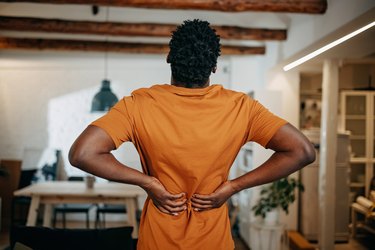
Lower back pain can make it hard to get a good night's sleep. And when you're not well rested, you may find your back feels even worse. So what can you do to get the shut-eye you need and feel better?
People with chronic pain, including lower back pain, are up to 18 times more likely to be diagnosed with insomnia compared to those who are pain-free, according to a June 2019 review in The Clinical Journal of Pain.
Video of the Day
Video of the Day
"Chronic pain can make it difficult to find a comfortable posture and forces frequent position changes," explains Abhinav Singh, MD, medical director of the Indiana Sleep Center and a medical review expert for SleepFoundation.org. "And it can cause both micro awakenings — ones you don't remember — and macro awakenings, or ones you do remember."
Finding ways to minimize your discomfort can help you sleep more soundly. And when you start logging the zzzs you need, you might actually find that your pain intensity gets dialed down, Dr. Singh notes. Here's what you can do to get started.
1. Find the Best Sleeping Position for You
Some sleep postures are better at taking pressure off your back than others. While there's no one-size-fits-all sleep position that works for everyone with lower back pain, experts generally agree that laying on your back is best.
Back-sleeping evenly distributes weight across the widest area of your body (your back!), which can reduce aggravation to pressure points, according to the Cleveland Clinic. Tucking a small pillow or rolled towel under your knees can support healthy spinal alignment and ease pressure even more.
If you're not a fan of back-sleeping, try snoozing on your side with a pillow between your knees, recommends the Mayo Clinic. This can help take some of the strain off your lower back, and if you switch sides throughout the night, you'll keep pressure from building up on sensitive points.
Sleeping in the fetal position — where your knees are brought all the way up toward your chin — helps relieve pressure on the intervertebral discs in the spine, which could help with back pain.
Above all, try to avoid sleeping on your stomach. Doing so forces you to crane your neck, which can throw off your spine's natural alignment and worsen (or cause) back discomfort.
If you have to sleep on your stomach, though, placing a pillow under your hips can help relieve pressure and decrease the risk of back pain.
2. Choose the Right Pillow
Just like there's no one sleep position that works for everyone, there's no perfect pillow for everyone with lower back pain. "The pillow that can keep the neck and spinal curvatures well supported will work best," Dr. Singh says.
If you're sleeping on your back, a medium-thick pillow that holds its shape will get the job done.
But if you snooze on your side, you may want something thicker and firmer to prevent your head from sinking and throwing your spinal alignment out of whack, according to the Sleep Foundation.
Material-wise, latex pillows tend to win out for their ability to retain their shape and keep pressure points at bay.
Related Reading
3. Choose the Right Mattress
Again, the goal of a great mattress for back pain is finding one that helps keep your spine aligned, Dr. Singh explains.
There's not necessarily one single choice that fits the bill — both innerspring and memory foam mattresses can deliver, as long as they're high-quality, according to the Cleveland Clinic. (Though if you're not up for buying a brand-new mattress, adding a memory foam mattress topper might also give you the support you need.)
The ideal mattress firmness level for back pain is individualized too. A firm mattress will best support the spine's natural curves for people whose waist and hips are about the same size, the Cleveland Clinic notes. If your hips are wider than your waist, a softer mattress is a better choice. The softer surface will give the mattress more give around your pelvic area, which can encourage comfortable spinal alignment.
More Tips for Managing Lower Back Pain While Sleeping
Addressing your sleeping position, pillow and mattress is a good start. But if those changes haven't done enough to ease your discomfort, these strategies can help.
1. Try to Log the Hours You Need
Sleep deprivation makes you more sensitive to pain, according to December 2019 findings in PLOS One. Put another way? The less sleep you get, the more likely your back is to bother you. This can lead to a vicious cycle of no sleep-more pain-no sleep, Dr. Singh explains.
With that in mind, do what you can to set the stage for good sleep to happen. Make sure your bedroom is cool, dark and quiet. Practice good sleep hygiene habits, like curbing afternoon caffeine use and avoiding screens before bed. Make it a point to go to bed and wake up at the same time each day too. Over time, a predictable sleep schedule sets your body's internal clock, so you'll naturally start to feel sleepy as bedtime approaches, per Harvard Health Publishing.
2. Practice Relaxing Distraction
Rhythmic breathing exercises or guided imagery, where you imagine yourself in a soothing, peaceful spot, can go a long way toward helping you nod off or fall back asleep when you wake during the night, per Harvard Health Publishing.
These easy meditation techniques can help you get started.
3. Consider Cognitive Behavioral Therapy
If at-home measures aren't working, consider trying cognitive behavioral therapy for insomnia under the guidance of a mental health professional. CBT-I programs can help you address the underlying causes that are making it hard to sleep, including unhealthy sleep behaviors and negative thought patterns that challenge your ability to get a good night's sleep, according to the Mayo Clinic.
While CBT-I can be effective for anyone with insomnia, your therapist can tailor your program to addressing sleep problems related to your lower back pain.
- The Clinical Journal of Pain: "Sleep and Pain: A Systematic Review of Studies of Mediation"
- Cleveland Clinic: "Is Your Sleep Position Causing You Back Pain?"
- Mayo Clinic: "Slide show: Sleeping positions that reduce back pain"
- SleepFoundation.org: "Best Pillows of 2022"
- PLoS One: "Total sleep deprivation increases pain sensitivity, impairs conditioned pain modulation and facilitates temporal summation of pain in healthy participants"
- Harvard Health Publishing: "How to sleep well despite chronic pain"
- Mayo Clinic: "Insomnia treatment: Cognitive behavioral therapy instead of sleeping pills"
Is this an emergency? If you are experiencing serious medical symptoms, please see the National Library of Medicine’s list of signs you need emergency medical attention or call 911.


